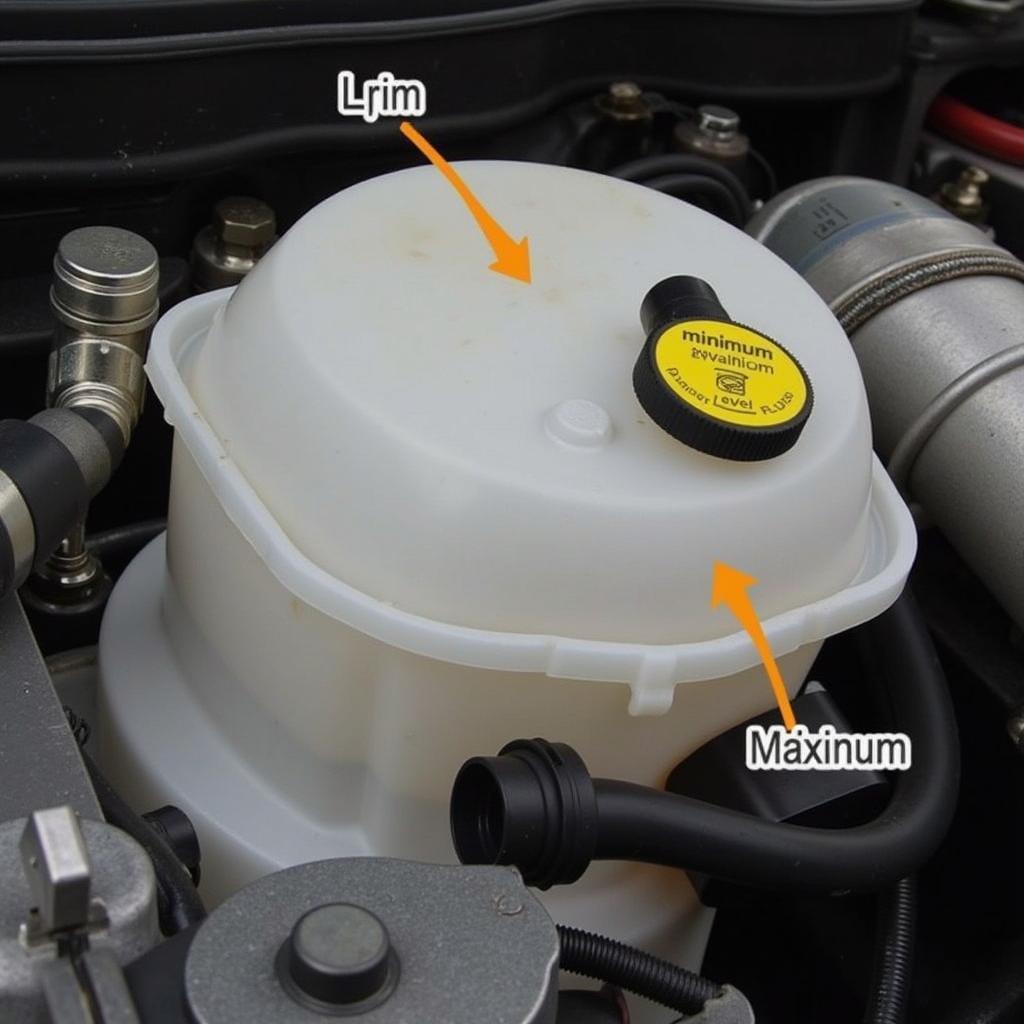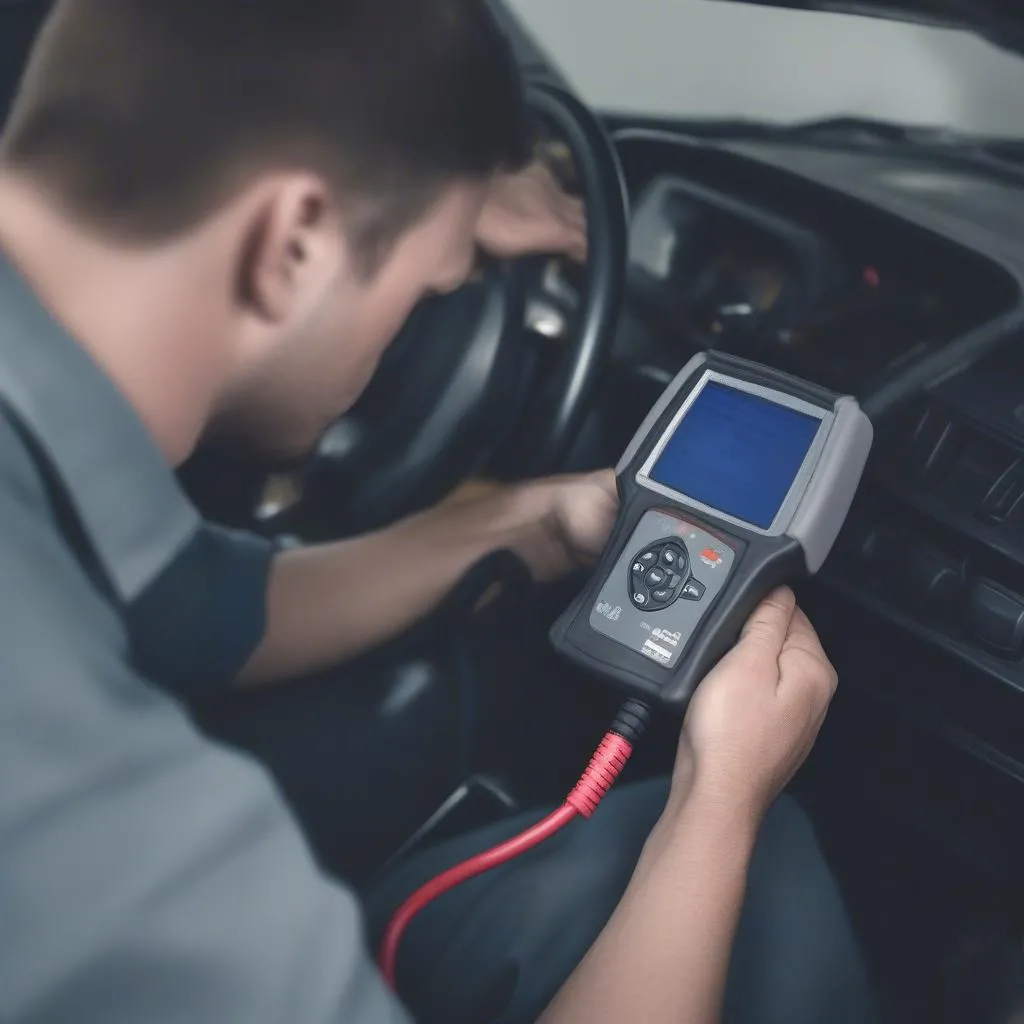Experiencing a brake warning light flickering on your dashboard can be unsettling. While it’s a relief when it disappears, ignoring it could lead to serious safety risks down the road. This comprehensive guide will help you understand why your brake warning light comes on then goes off, potential causes, and how to address them effectively.
Why is My Brake Warning Light Intermittent?
An intermittent brake warning light suggests an underlying issue that comes and goes. It’s crucial not to dismiss it as a temporary glitch. Here are some common culprits:
- Worn Brake Pads: As your brake pads wear down, the brake fluid level in the reservoir drops. This can trigger the warning light, especially when braking. However, the light might turn off when the vehicle is stationary, and the fluid level temporarily rises.
- Faulty Brake Fluid Sensor: A malfunctioning sensor might provide inaccurate readings, causing the light to flicker on and off intermittently.
- Air in the Brake Lines: Air trapped in the brake lines can compress, leading to inconsistent hydraulic pressure and triggering the warning light.
- Loose or Damaged Wiring: A loose connection or damaged wire within the brake warning light system can cause an intermittent signal.
- Failing ABS System: While less common, a failing Anti-lock Braking System (ABS) can also trigger the brake warning light. This often accompanies an illuminated ABS warning light.
 Brake Fluid Reservoir and Sensor
Brake Fluid Reservoir and Sensor
What to Do When Your Brake Warning Light is Intermittent
If your brake warning light comes on and off, it’s crucial to take immediate action:
- Check Brake Fluid Level: Park on a level surface and inspect the brake fluid level in the reservoir. If it’s below the minimum mark, add the correct type of brake fluid as specified in your owner’s manual.
- Inspect for Leaks: Carefully examine the area around the master cylinder, brake lines, and calipers for any signs of brake fluid leaks. A leak can lead to inconsistent brake fluid levels and trigger the warning light.
- Avoid Driving (If Possible): If you suspect a serious issue, avoid driving and consult a qualified mechanic immediately. Driving with compromised brakes poses a significant safety risk.
When to Seek Professional Help
While some causes might seem minor, it’s essential to remember that brakes are critical safety components. Seeking professional help is recommended if:
- The warning light persists: If the brake warning light stays on consistently, even after adding brake fluid, it indicates a more serious problem that requires immediate attention.
- You notice brake fluid leaks: Any visible leaks in the braking system demand immediate professional repair.
- You experience braking issues: If you encounter spongy brakes, unusual noises when braking, or a longer stopping distance, seek professional help immediately.
“Ignoring an intermittent brake warning light is like playing Russian roulette with your safety,” warns John Miller, a certified automotive technician with over 20 years of experience. “Even if it’s a minor issue, addressing it promptly can save you from costly repairs and potential accidents.”
Preventing Future Brake Warning Light Issues
Proactive maintenance can significantly reduce the chances of encountering brake warning light issues:
- Regular Brake Inspections: Schedule routine brake inspections, especially as part of your regular vehicle maintenance.
- Timely Brake Pad Replacements: Adhere to the manufacturer’s recommendations for brake pad replacement intervals.
- Quality Brake Fluid: Use high-quality brake fluid and flush the system according to your vehicle’s maintenance schedule.
FAQs
Q: Can a low battery cause the brake warning light to come on?
A: While uncommon, a severely low battery can sometimes disrupt the vehicle’s electrical system, potentially causing the brake warning light to illuminate. However, other warning lights, such as the battery warning light, will likely accompany it.
Q: Is it safe to drive with the brake warning light on intermittently?
A: No, it is not safe to drive with the brake warning light on intermittently. This indicates a potential issue with your braking system, and continuing to drive could lead to brake failure and accidents.
Conclusion
Addressing a brake warning light that comes on then goes off should be a top priority. While it might be tempting to dismiss it as a minor glitch, it often signifies underlying issues within your braking system.
For more information regarding specific brake warning light concerns, explore these relevant resources:
- brake pressure warning light
- yellow brake fluid warning light on 1983 mercedes 300d
- warning lights seat ibiza
- camry brake warning light 2006
- 04 toyota solara brake warning light abs and on
Remember, ensuring the optimal functionality of your vehicle’s braking system is paramount for your safety and the safety of others on the road.

